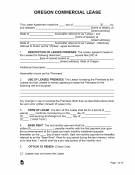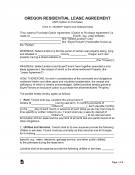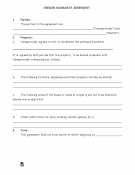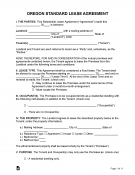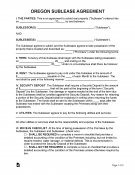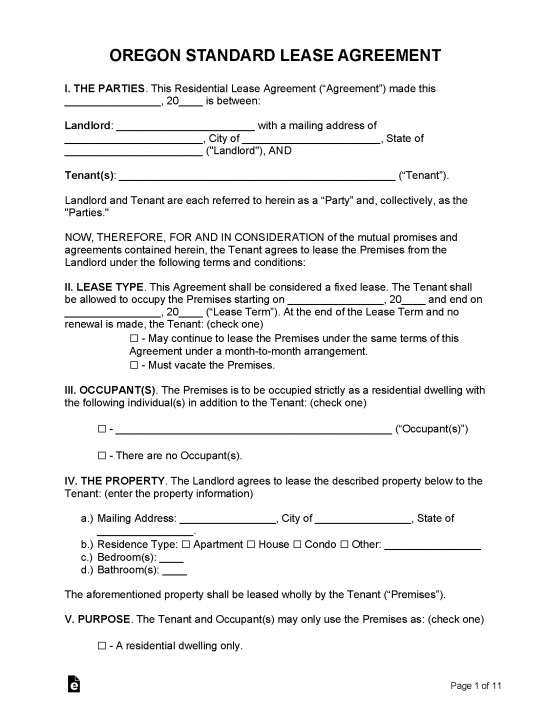Oregon lease agreements contain the terms of a tenant’s lease of a landlord’s property in exchange for monthly rent. Along with identifying how much the tenant has to pay, lease agreements can specify which party is responsible for utilities, whether pets are permitted, and other common issues that landlords and tenants need to work out before a property is occupied. Both parties should keep a copy of the lease agreement, and refer to it when uncertainties arise about their obligations under the lease.
Contents
- Oregon Lease Agreements: By Type (6)
- Landlord-Tenant Laws
- Handbooks and Guides
By Type (6)
- Commercial Lease Agreement
- Month-to-Month Lease Agreement
- Rent-to-Own Lease Agreement
- Roommate Lease Agreement
- Standard Lease Agreement
- Sublease Agreement
Download: Adobe PDF, MS Word, Rich Text Format
Month-to-Month Lease Agreement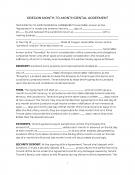
Download: Adobe PDF, MS Word, Rich Text Format
Download: Adobe PDF, MS Word, Rich Text Format
Download: Adobe PDF, MS Word, Rich Text Format
Download: Adobe PDF, MS Word, Rich Text Format
Download: Adobe PDF, MS Word, Rich Text Format
Landlord-Tenant Laws
Statutes – Volume 3, Chapter 90 (Residential Landlord and Tenant)
Required Disclosures (10)
Person Authorized to Manage the Premises – Lease agreements must identify and provide a means of contacting the person or persons authorized to come on to the property to make repairs, and to receive notices and complaints. (§ 90.305)
Carbon Monoxide Alarms – All properties with a heater or other appliance capable of emitting carbon monoxide must be equipped with detecting carbon monoxide alarms under the State Fire Marshal’s rules (See Guide). If the alarms are battery-operated, landlords must give the tenant new batteries for the alarm at the beginning of a tenancy. (§ 90.316)
Flood Plain – Landlords must disclose whether the property being rented lies within a 100-year flood plain. (§ 90.228)
Lead-Based Paint Disclosure – If leasing a property with a dwelling unit built before 1978, federal law obligates the landlord to include an explanation of the dangers of lead paint in the lease agreement.
Move-in Checklist (City of Portland only) – Within one (1) week of the beginning of a tenancy, the landlord must provide tenants with a checklist that the tenant can use to evaluate the condition of the property at the time of move-in, and which will later be used to determine the amount that the landlord is permitted to deduct from the tenant’s security deposit. If the tenant does not complete the checklist within seven (7) days of moving in, the landlord must present the tenant with a conditions report, including digital photographs, within seventeen (17) days of the tenant moving in. (§ 30.01.087(D)(1))
Outstanding Notices/Pending Suits – If a property has four (4) or fewer dwelling, units then the landlord must inform tenants of the following when they apply (§ 90.310):
- Any outstanding notice of default under a trust deed, mortgage or contract of sale, or notice of trustees sale under a trust deed;
- Any pending suit to foreclose a mortgage, trust deed or vendors lien under a contract of sale;
- Any pending declaration of forfeiture or suit for specific performance of a contract of sale; or
- Any pending proceeding to foreclose a tax lien.
Recycling – Landlords leasing residences that are (i) found in a building of multi-family units containing more than four (4) units and, (ii) located within an Urban Growth Boundary, must include information about recycling methods in the lease agreement. (§ 90.318)
Security Deposit Receipt (City of Portland only) – If a landlord requires a security deposit for a lease, the landlord must, within keep the deposit in a bank or other depository institution, not mingled with the landlord’s own funds. Within two (2) weeks of the beginning of the tenancy, the landlord must provide the tenant with a receipt with the name and location of the institution keeping the deposit. Interest earned on the deposit is the property of the tenant. (§ 30.01.087(B)(1))
Smoking Policy – Landlords must make tenants aware of all rules associated with smoking on the property in a form signed by both parties. (§ 90.220)
Utility/Service Fees – If the utilities on a property are arranged in such a way that a tenant may be paying for usage other than his or her own, this information must be disclosed to the tenant in the lease agreement. (§ 90.315)
Security Deposit Laws
Maximum Amount ($)
State law places no limit on how much a landlord may charge as a security deposit, but some jurisdictions, including Portland, impose their own limits, so landlords should consult the local municipal code.
Returning to Tenant
Landlords may retain all or a portion of a tenant’s security deposit only to remedy violations of the lease agreement (including the failure to pay rent), and pay for cleaning or repairs (not including those resulting from normal wear-and-tear).
In order to retain any of the security deposit, the landlord must provide the tenant with a written accounting of any deductions. This must be sent by mail to the tenant, along with any remaining funds, within thirty-one (31) days of the termination of the tenancy. (§ 90.300)
When is Rent Due? (grace period)
Rent is due on the day specified in the lease agreement, but it is not considered late until at least four (4) days after that date. (§ 90.260)
Eviction Notice (non-payment)
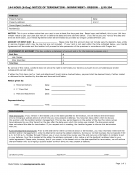 Notice to Pay or Quit – If a tenant fails to pay rent on the date it is due, Oregon landlords have two options. They may wait until at least the fifth day after rent remains unpaid, and provide the tenant with a six-day notice to quit, informing the tenant that the landlord may terminate the lease agreement if all owed rent is not paid within six (6) days of the date the notice is delivered. Or they may wait until at least the eighth (8th) day after the due date in the lease agreement, and give the tenant a three-day notice to quit. (§ 90.394)
Notice to Pay or Quit – If a tenant fails to pay rent on the date it is due, Oregon landlords have two options. They may wait until at least the fifth day after rent remains unpaid, and provide the tenant with a six-day notice to quit, informing the tenant that the landlord may terminate the lease agreement if all owed rent is not paid within six (6) days of the date the notice is delivered. Or they may wait until at least the eighth (8th) day after the due date in the lease agreement, and give the tenant a three-day notice to quit. (§ 90.394)
Maximum Fees ($)
Late Rent Penalties
Rent is not considered late until at least five (5) days after the date established in the lease agreement. Landlords may not charge a late fee unless the fee is clearly identified in the lease agreement. Any fee charged must be reasonable, and may accumulate daily but not exceed six percent (6%) of the monthly rent, or may accumulate every five (5) days but may not exceed five percent (5%) of the monthly rent per five-day period. (§ 90.260)
NSF Checks
Landlords that plan to charge a fee to tenants who offer bounced rent checks must state the fee in the lease agreement. In no case may the fee be greater than $35. (§ 30.701).
Tenant’s Unclaimed Property
Landlords have a duty of care toward tenants whose non-perishable, non-refuse personal property was found in a dwelling unit after the termination of the tenancy, whether through the scheduled end of the tenancy, abandonment, or a judicial declaration, such as eviction. If personal property is found, landlords should store the property and inform the tenant in writing.
Landlords must store the property for at least eight (8) days after mailing the tenant a notice. If during that period the landlord receives a response from the tenant, the landlord must store the property for at least an additional fifteen (15) days and make reasonable arrangements for the tenant to retrieve it. (More notice is required for motor vehicles left behind on a property.) If the tenant fails to respond, the landlord may sell the property in a public or private sale, and use the proceeds to account for any unpaid rent and the cost of storing the property. The remainder belongs to the tenant; if the tenant cannot be found, the landlord should deliver the remaining proceeds to the county tax collector. (§ 90.425)
